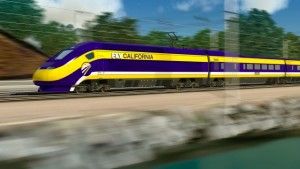Coming days could be pivotal in bullet-train fight
by Chris Reed | October 8, 2013 9:25 pm
 Friday — or sooner — will see a crucial development in the five-year fight over implementation of Proposition 1A[1], the 2008 ballot measure that provided $9.95 billion in bond seed money for a statewide bullet-train project while establishing a state law to ensure the funds are properly sent.
Friday — or sooner — will see a crucial development in the five-year fight over implementation of Proposition 1A[1], the 2008 ballot measure that provided $9.95 billion in bond seed money for a statewide bullet-train project while establishing a state law to ensure the funds are properly sent.
That is the deadline for the California High-Speed Rail Authority to respond to a landmark ruling by Sacramento Superior Court Judge Michael Kenny[3], who is hearing a series of related challenges to the rail authority's project. On Aug. 16, Kenny released a decision related to a lawsuit filed by Kings County, Hanford farmer John Tos and homeowner Aaron Fukuda that agreed with their arguments that the rail authority would be breaking state law[4] in two ways if it began construction of the project, as is now planned for 2014.
The judge held that the state had failed to identify the sources for the entire $31 billion needed to complete the bullet train's “initial operating segment” from Merced to the San Fernando Valley and to obtain all necessary environmental approvals for that segment.
Instead of ordering the project be halted, however, Kenny scheduled a “remedies” hearing for Nov. 8 at which the state would discuss how it planned to address the deficiencies in its business plan and the inadequacies of its environmental reviews. The plaintiffs have already sent Kenny their proposed order. It argues that based on his Aug. 16 decision, the judge has no choice but to “permanently enjoin” the rail authority from proceeding with construction until it was in compliance with state law.
Set grounds for appeal — or accept likely long delays?
Observers of the Kings County lawsuit say rail authority officials — and Gov. Jerry Brown, who emerged as a vigorous project backer in late 2011 — have a starkly difficult decision to make in their remedies filing.
If they accept Kenny's interpretation of Proposition 1A, their remedies would delay construction indefinitely and possibly permanently. It's not just that full environmental reviews will take years, with project opponents having many opportunities to employ the NIMBY tactics long honed by California environmentalists. It's the daunting task of finding more than $20 billion in firm new funding for the project. In the sequester era, the federal spigot that previously provided more than $3 billion in funds has been turned off. No private investors are interested without the sort of revenue or ridership guarantees that are forbidden under Proposition 1A.
But if the rail authority rejects Kenny's interpretation, that would foreshadow an appeal of his ruling and probably also prompt an indefinite delay on construction. Having ruled the state's plan violated two of Proposition 1A's key taxpayer protections, the judge is unlikely to say construction can begin while his decision is appealed.
This suggests the only way ground can be broken next year as planned in the Central Valley is under extraordinary circumstances: a state appellate court issuing what amounts to an emergency suspension of Kenny's Aug. 16 ruling.
'The protections … must now be taken seriously'
 Among those who consider this extremely unlikely is Quentin Kopp, the former San Francisco judge and state senator who is considered the father of the state bullet-train project and who helped write Proposition 1A. Kopp no longer supports the project touted by the rail authority. “It is not at all what we promised voters,” he told me in an interview in which he expressed deep satisfaction with Kenny's decision. “The protections in the proposition must now be taken seriously.”
Among those who consider this extremely unlikely is Quentin Kopp, the former San Francisco judge and state senator who is considered the father of the state bullet-train project and who helped write Proposition 1A. Kopp no longer supports the project touted by the rail authority. “It is not at all what we promised voters,” he told me in an interview in which he expressed deep satisfaction with Kenny's decision. “The protections in the proposition must now be taken seriously.”
If that happens, the bullet-train project is imperiled on other legal grounds as well. A key provision of Proposition 1A was the requirement that the train be true high-speed rail, defined as going the 400-plus miles from downtown Los Angeles to downtown San Francisco in two hours and 40 minutes or less[5].
But under the revised “blended” plan approved by Brown to reduce the project's estimated cost from $98 billion to $68 billion, such a result appears impossible. The “blended” blueprint would only provide true high-speed rail from San Jose to the northern reaches of sprawling Los Angeles. At each end, travelers would have to switch to regular commuter rail. Even a four-hour trip looks optimistic under such circumstances.
The rail authority has never been able to offer any credible documentation[6] that the 160-minute requirement could be met under its revised plan. Instead, it cites “verbal assertions based on (the) skill, experience and optimism” of project engineers.
This weakness of the rail authority's plan is targeted[7] in another lawsuit being heard by Kenny. Kings County, the Howard Jarvis Taxpayers Association and two other parties argue that the state cannot legally issue the $9.95 billion in bonds authorized by voters in 2008 because the “blended” system is not what they approved and is far from a “statewide high-speed rail system.” A state review panel cleared the issuance of the bonds in March.
Kenny's decision in that case is expected this month, according to the Fresno Bee.
- Proposition 1A: http://voterguide.sos.ca.gov/past/2008/general/argu-rebut/argu-rebutt1a.htm
- best internet security software: http://cheapinternetsecuritysoftware.com/
- Michael Kenny: http://www.sacbar.org/pdfs/saclawyer/nov_dec2003/kenny.html
- would be breaking state law: http://www.latimes.com/local/lanow/la-me-ln-bullet-train-funding-plan-at-odds-with-state-law-judge-rules-20130816,0,4126354.story
- two hours and 40 minutes or less: http://reason.com/archives/2013/07/10/bullet-trains-derailed
- credible documentation: http://www.huffingtonpost.com/2012/06/13/california-bullet-train-speed_n_1594671.html
- targeted: http://www.fresnobee.com/2013/09/27/3522448/judge-will-decide-if-high-speed.html
Source URL: https://calwatchdog.com/2013/10/08/coming-days-could-be-pivotal-in-bullet-train-fight/